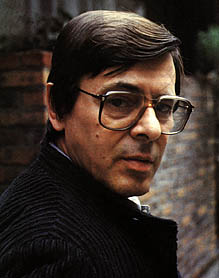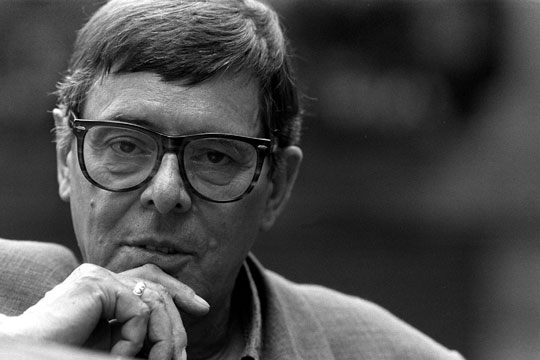<Back to Index>
- Writer José Ángel Valente, 1929
PAGE SPONSOR


Jose Angel Valente (Orense, April 25 of 1929 - Geneva, July 18 of 2000) was a Spanish poet, essayist and translator.
He studied law at the University of Santiago de Compostela and graduated in Philology from the Complutense. He was at the Department of Philology of the University of Oxford. Between 1950 and 1970 he lived in Geneva, then divided his time between Almeria, Geneva and Paris .His story "The general's uniform", included in the volume The number thirteen, created problems for him with the Franco dictatorship and therefore was court-martialed in 1972 accused of being offensive to the army. The death of his only son affected him greatly.
Initially assigned to the so-called Group of 50 or the mid-century poetic generation, since 1966 his poetry evolved into a metapoetry that has led to his being classified as a lyric poet of silence, heavily influenced by mystical syncretism, such as the Jewish Kabbalah, the Iranian Sufism, Christian mysticism (primarily through figures like San Juan de la Cruz or Miguel de Molinos), Taoism and Zen Buddhism, among others. His approach to the mystic, however, is far from any religious dogma and did not postulate necessarily the belief in a personal deity. His entry into mysticism occurred largely under the guidance of the philosopher María Zambrano Malaga. Assimilating philosophical trends and historical cultural traditions in poetry and prose and also through music and painting, the writing of José Ángel Valente is one of the most ambitious and profound contemporary pieces of Spanish literature, in the opinion of G. de Cortanze. As heir to the Spanish mystic tradition, he showed his obsession with the problems of ineffability, emptiness and nothingness. The language and matter are other obsessions, not far from his courting the mystical.
As essayist topics of choice were painting and the mystical. Emphasized in books Tribe's words, essays on literature, Hermeneutics and mystical, on San Juan de la Cruz and Variations on the bird and the network (1991), a series of meditations on Miguel de Molinos, Santa Teresa and painters Matthias Grünewald and Bosco. In 2002 he published his critical works on art with the title on Praise the calligrapher. His poetry looks in the context of post war crisis and turns against the materialistic spirit of postmodern and postindustrial society. It is an attempt at breaking free from the present and from a history of injustice. Paradoxically, this is set in an idealized past, meta-poetic, where redemption is understood as a necessary illusion.
He has translated poetry and literature essays written in German and French. He wrote his poetry mainly in Castilian, but also in Galician in his Cantigas de Alen.
He is the author of art books in collaboration with artists such as Antonio Saura (Badges, 1978), Antoni Tapies (The pendulum still, 1982), Paul Rebeyrolle (Disappearance Figures, 1982) or Jürgen Partenheimer (what singable Root, 1991) and with photographer Jeanne Chevalier (Calas, 1980).
Notable is his influence on the poetry of authors like Antonio Gamoneda, Andres Sanchez Robayna or Ada Salas.